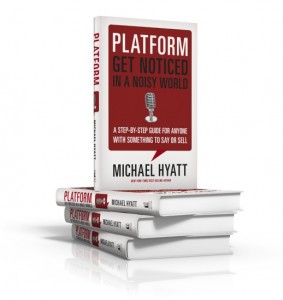As someone who has recently passed through the long and sometimes painful process of finding a literary agent, submitting a book proposal to numerous publishers, and then negotiating a book contract, I know how important the word “platform” is.
Although I’d previously associated it only with trains on my daily commute to work in Glasgow, I now know that it’s probably the number one thing that most publishers are looking for. You can have the greatest idea or epic story, and you can write like C S Lewis or J K Rowling, but without a platform you’re not getting near the bookshelves, I’m afraid.
A platform is basically what we stand on to raise us above ground level. It’s what lifts us a bit higher than our surroundings. In the publishing or business context, it’s whatever gets our writing or product noticed or stand out from the crowd.
In the “olde world” a platform was built out of marketing and advertising, newspaper ads, TV and radio commercials, brochures and leaflets, etc. In the new digital world it’s built out of Blogs, Tweets, Status updates, Likes, Youtube, podcasts, etc.
Good and bad news
And that’s good news and bad news. The good news is that building a platform today is much cheaper and much more accessible. We can all do it; in fact, we are all doing it; the only question is how consciously, thoughtfully, and deliberately we are doing it. The bad news is that it’s so time-consuming, so difficult to do well, and so spiritually hazardous.
And that’s where Michael Hyatt comes in. Michael has been involved in publishing for many years and is presently Chairman of Thomas Nelson. I’ve learned so much from reading his lively blog over the past couple of years. He has great insights on leadership, writing, and publishing – his Writing a winning book proposal was a godsend to me.
Social Media Pioneer
But it’s in the vast and challenging area of social media that Michael really excels. As one of the world’s social media pioneers, he has huge experience and expertise to share. And if Michael’s anything, he’s one of the world’s sharers. That’s probably why he’s been so successful in social media; because the willingness to share value, to involve, engage, benefit, and bless others is the DNA of any edifying and effective social media strategy.
Well, you’ll be glad to know that Michael’s impulse to share has led him to publish a book on this subject. It’s called Platform: Get Noticed in a Noisy World. He describes it as “A step-by-step guide for anyone with something to say or sell.” And if you buy before May 25 you can get $375 worth of bonus material.
Blook?
I finished the book last night while waiting in the forest for Thanksgiving Dinner (they didn’t oblige, but we’ll be back tonight!), and appropriately enough it was the first book I’ve read entirely on my iPhone! The format of the book really helped that because it’s split into five main sections with numerous blog-length chapters in each section, all of them characterized by compact, practical, lively writing, and most of them presented in list/bullet format.
And whether we like it or not, I think Michael’s ahead of the curve here again in his employment of blog-style writing in book form (a blook?). It definitely works. And I learned a lot, or at least realized how much I have to learn, because this is a book I’ll be coming back to again and again.
Spiritually hazardous
But let me briefly return to the “spiritually hazardous” nature of social media and platform building. Probably most Christians, especially those in ministry, wish that this subject would go away. The idea of building a platform seems, on the face of it, so antithetical to the essence of Christianity. How can we possibly square this with personal humility, meekness, self-denial, and John-Baptist-like “He must increase, I must decrease” etc? Although Michael touches on this, its a question I’d like to see him tackle at greater length, perhaps on his blog or on his podcast.
There must be some specifically Christian guidelines for this, some way that Christians can be refreshingly different from the world. For those in ministry, maybe it all comes down to who’s really on the platform. Is it me? Or is it Christ? Am I building up myself? Or am I building a platform for Jesus?

Pingback: Advice on Blogging and $375.00 Dollars Worth of Free Materials « joshchalmers
Pingback: Book Review Platform | Servants of Grace
Pingback: Book Review: Platform | Books